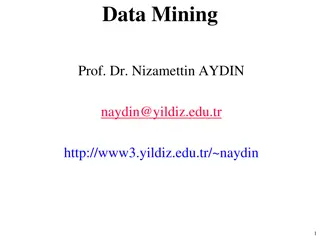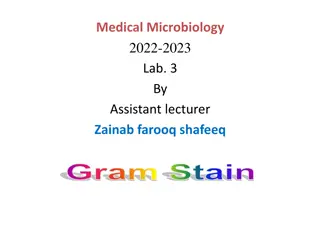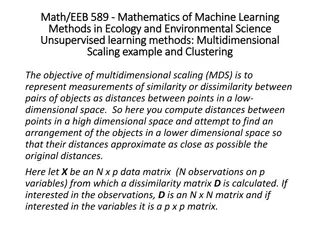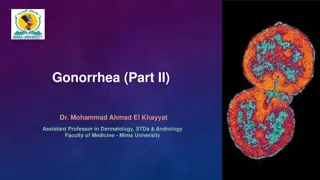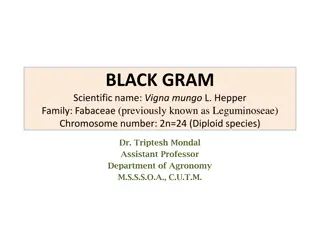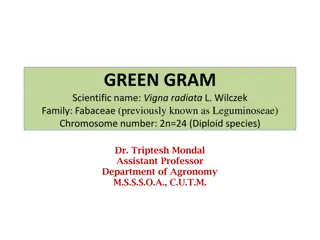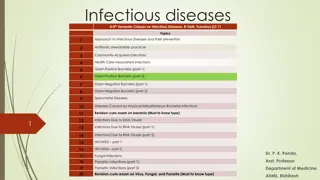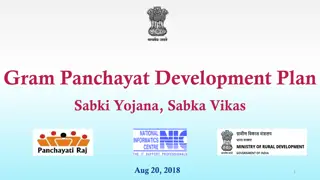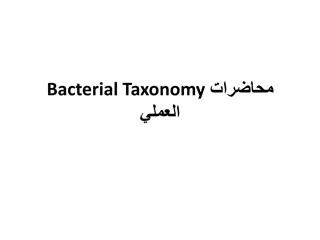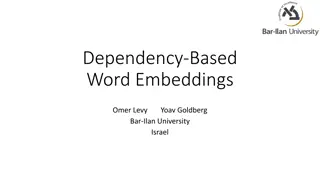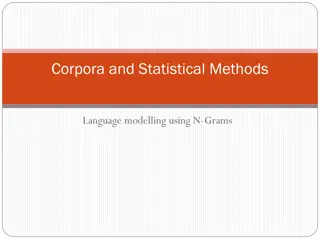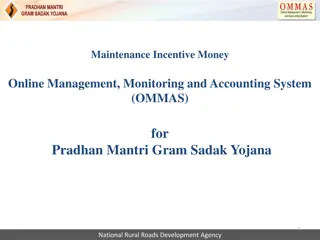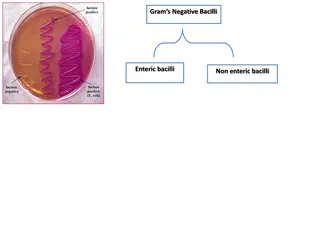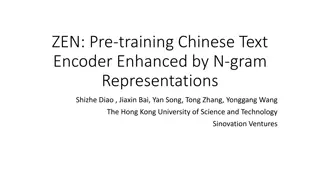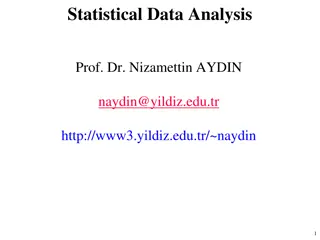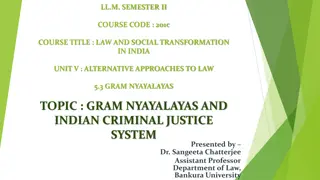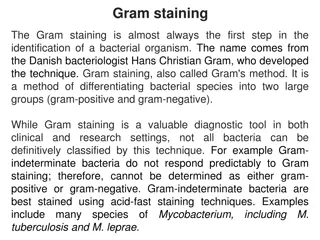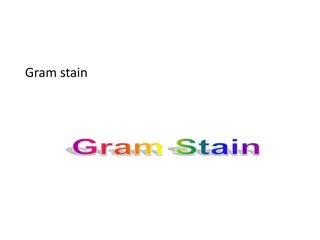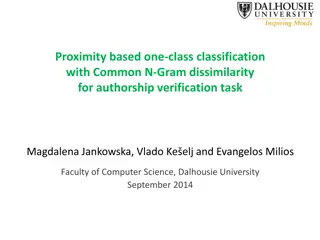Buy Atomic Platinum 10-GRAM Bag Online - mysteriousplant.com
Buy Atomic Platinum 10-GRAM Bag OnlineAtomic Platinum 10-GRAM Bag is highly potent, with such a wonder aroma. Do you think you can handle it? Our products are 100 % legal and are medical.\nEmail: sales@mysteriousplant.com\n
11 views • 2 slides
Understanding Antibiotic Therapy in the ICU: Strategies and Considerations
Delve into the world of antibiotic therapy in the intensive care unit (ICU) with a focus on identifying the enemy pathogens, selecting the appropriate antibiotics, and formulating effective treatment plans. Explore the nuances of Gram-positive and Gram-negative bacteria, along with other key bacteri
4 views • 76 slides
Panchayat Budget Planning and Revenue Collection Process
Explore the detailed process of budget planning and revenue collection in a Panchayat, including the steps for calling Gram Sabha meetings, preparing assessment lists, finalizing fee structures, and obtaining public approval in a systematic manner. The process involves active involvement of Sarpanch
1 views • 29 slides
Pradhan Mantri Gram Sadak Yojana eMARG - Digital Transformation for Rural Roads
The Pradhan Mantri Gram Sadak Yojana eMARG is a digital initiative aimed at enhancing the maintenance of rural roads under PMGSY. Additional modules have been introduced to address exceptional cases, including the partial or full transfer of roads to other departments during the Defect Liability Per
4 views • 40 slides
Buy Joker 50 GRAM Bag Online - herbalincense24.com
In a world where convenience and versatility are paramount, the Joker 50g Bag Herbal Incense emerges as a reliable solution for various storage needs.\nWhat is the Joker 50g Bag Herbal Incense?\nThe Joker 50-GRAM Bag is a compact storage accessory designed to accommodate up to 50 grams of your essen
22 views • 9 slides
Buy Master Kush 50g Bag Online - herbalincense24.com
Master Kush, a name that resonates Master Kush 50g Bag herbal incense is renowned for its potent effects and unmistakable aroma. In this article, we delve into the allure of the Master Kush 50-gram bag, exploring its origins, characteristics, effects, and much more. Introduction Master Kush has long
8 views • 10 slides
Earth-GRAM Overview and Update Status
Earth-GRAM is undergoing significant upgrades including updates to the Global Reference Atmospheric Model suite. The upgrade team aims to modernize code, incorporate state-of-the-art data sources, enhance user support, and address limitations. The team comprises experts from NASA Langley Research Ce
0 views • 22 slides
Earth-GRAM Overview and Updates 2023
Earth-GRAM is a global reference atmospheric model providing monthly mean and standard deviation data for various atmospheric variables. It is used in engineering for dispersion simulations but is not a forecasting model. Updates to Earth-GRAM include the Modern Era Retrospective Analysis, a global
0 views • 19 slides
Understanding Similarity and Dissimilarity Measures in Data Mining
Similarity and dissimilarity measures play a crucial role in various data mining techniques like clustering, nearest neighbor classification, and anomaly detection. These measures help quantify how alike or different data objects are, facilitating efficient data analysis and decision-making processe
1 views • 51 slides
Production and Uses of Wheat, Rice, Legumes, and Sugarcane
Cereals like wheat and rice, along with legumes such as pigeon pea and gram, play vital roles in food production and consumption. Wheat, known for its versatility in various forms like flour, bread, and beer, is a significant crop globally. Rice, a staple in many parts of the world, requires process
0 views • 12 slides
Understanding the Gram Stain Technique in Medical Microbiology Lab
The Gram stain is a crucial technique in bacteriology, dividing bacteria into Gram-positive and Gram-negative groups based on cell wall characteristics. This method involves using crystal violet, iodine, ethanol, and safranin to differentiate between the two types of bacteria. Gram-positive bacteria
0 views • 11 slides
Understanding Multidimensional Scaling and Unsupervised Learning Methods
Multidimensional scaling (MDS) aims to represent similarity or dissimilarity measurements between objects as distances in a lower-dimensional space. Principal Coordinates Analysis (PCoA) and other unsupervised learning methods like PCA are used to preserve distances between observations in multivari
2 views • 21 slides
Overview of Corynebacterium: Characteristics, Infections, and Laboratory Diagnostics
Corynebacterium is a genus of Gram-positive rod-shaped bacteria widely distributed in nature. They are catalase positive, non-spore-forming, non-motile bacteria with unique morphological features. The most notable human infection caused by Corynebacterium is diphtheria, characterized by the formatio
0 views • 25 slides
Understanding Anaerobic Infections: A Case Study in Clinical Microbiology
In this case study, two patients present with fever, neck pain, and previous misdiagnoses of viral pharyngitis. Blood cultures reveal anaerobic growth, with Gram stain showing pleomorphic Gram-negative rods. Anaerobic cultures require specialized conditions for growth, such as anaerobic glove box in
1 views • 14 slides
Overview of Bacterial Morphology and Cell Structure
This article discusses the morphology of both Gram-positive and Gram-negative bacteria, highlighting examples of different arrangements and shapes. It also explores the structure and functions of bacterial cell walls, emphasizing the role of teichoic acids in Gram-positive cell walls. Additionally,
1 views • 38 slides
Gonorrhea Diagnostic Methods and Tests Overview
Dr. Mohammad Ahmad El Khayyat, an Assistant Professor in Dermatology, STDs, and Andrology, details the diagnostic methods and tests for gonorrhea. Various tests including Gram stain, culture, antigen detection tests, and nucleic acid amplification tests are discussed, highlighting sensitivity and sp
1 views • 30 slides
Overview of Black Gram (Vigna mungo L.) and Its Economic Importance
Black gram, scientifically known as Vigna mungo L., is a significant pulse crop with various economic uses. It is consumed as dal, used in traditional dishes, and serves as livestock feed. The seeds are rich in protein, vitamins, and minerals, making them a valuable food source. Originating in India
0 views • 22 slides
Overview of Green Gram (Vigna radiata L.): Economic Importance, Origin, and Classification
Green gram, scientifically known as Vigna radiata L., is a highly digestible pulse crop with various uses such as consumption as whole grains or dal, making flour for cakes, and as fodder for cattle. It is grown widely in Southern Asia and other countries, with India being a significant producer. Gr
0 views • 23 slides
Infectious Diseases 4/5th Semester Classes: Approach & Prevention
Infectious Diseases class focuses on various topics including Antibiotic Stewardship Practices, Community-Acquired Infections, Gram-Positive and Gram-Negative Bacteria, Spirochetal Diseases, Diseases Caused by Bacterial and Viral Infections, HIV/AIDS, Fungal and Parasitic Infections. The class also
3 views • 30 slides
Empowering Gram Panchayats: Development Plan and Implementation Challenges
The Gram Panchayat Development Plan (GPDP) aims for inclusive growth and development but faces challenges like lack of awareness, limited sectoral presence, and isolated departmental work. The process involves setting long-term goals, data collection, prioritizing activities, and reviewing progress
0 views • 19 slides
Guidelines for Social Audits under MGNREGA
The legal mandate for social audits under MGNREGA includes the requirement for conducting audits by Gram Sabhas, setting up independent Social Audit Units, and involving Village Social Audit Facilitators. The process involves collating records, conducting beneficiary and work verification, and prese
1 views • 19 slides
Understanding Bacterial Cell Structure and Function
Bacteria display unique cellular structures and functions that differ from eukaryotic cells. They have a simple structure with a plasma membrane but lack complex internal membrane systems. The cytoplasm contains inclusion bodies, ribosomes, and genetic material in the nucleoid. Bacteria can be categ
4 views • 21 slides
Understanding Bacterial Taxonomy and Staining Techniques
Bacterial taxonomy involves classifying and identifying bacteria, while staining techniques such as Gram staining help differentiate between Gram-positive and Gram-negative bacteria. This article discusses the importance of distinguishing bacterial strains, preparing smears, and performing different
0 views • 17 slides
Advancements in Word Embeddings through Dependency-Based Techniques
Explore the evolution of word embeddings with a focus on dependency-based methods, showcasing innovations like Skip-Gram with Negative Sampling. Learn about Generalizing Skip-Gram and the shift towards analyzing linguistically rich embeddings using various contexts such as bag-of-words and syntactic
0 views • 39 slides
Understanding N-Gram Models in Language Modelling
N-gram models play a crucial role in language modelling by predicting the next word in a sequence based on the probability of previous words. This technology is used in various applications such as word prediction, speech recognition, and spelling correction. By analyzing history and probabilities,
0 views • 101 slides
Online Management System for Pradhan Mantri Gram Sadak Yojana (OMMAS) - User Guide
This user guide provides step-by-step instructions on how to access and utilize the Maintenance Incentive Money Online Management, Monitoring, and Accounting System (OMMAS) for the Pradhan Mantri Gram Sadak Yojana. It includes details on logging in, navigating the system, generating vouchers, and en
0 views • 17 slides
Understanding Triad Tests in Cognitive Anthropology
Triad tests are a valuable tool in cognitive anthropology, originally introduced by George Kelly in 1955. They involve presenting individuals with sets of three items and eliciting responses based on similarity or dissimilarity. This method allows researchers to explore differences in cognition acro
1 views • 27 slides
Overview of Gram-Negative Enteric Bacilli
Gram-negative bacilli are a diverse group of bacteria, including enteric and non-enteric bacilli. Common characteristics include being aerobic or facultative anaerobes, fermenting glucose, and being part of the normal flora of the human and animal gastrointestinal tract. Escherichia coli (E. coli) i
0 views • 27 slides
Sustainable Development Initiatives and Vision Planning at Gram Panchayat Level in Karnataka
In Karnataka, the Gram Panchayats are mandated to prepare Vision Plans focusing on local development and Sustainable Development Goals. This involves identifying gaps in sectors like Health, Education, Environment, and more. The process includes forming planning teams, conducting training programs,
0 views • 11 slides
Understanding the Rise of Gram-Negative Bloodstream Infections in Healthcare
Gram-negative bloodstream infections (GNBSI) are becoming more prevalent in healthcare settings, posing a significant challenge due to increasing antimicrobial resistance. The prevalence of GNBSI is on the rise, causing concern for healthcare professionals globally. Strategies to combat GNBSI must b
0 views • 46 slides
ZEN: Pre-training Chinese Text Encoder Enhanced by N-gram Representations
The ZEN model improves pre-training procedures by incorporating n-gram representations, addressing limitations of existing methods like BERT and ERNIE. By leveraging n-grams, ZEN enhances encoder training and generalization capabilities, demonstrating effectiveness across various NLP tasks and datas
0 views • 17 slides
Understanding Infectious Diseases: Approach, Prevention, and Viral Agents
Infectious diseases play a significant role in public health, with a focus on antibiotic stewardship, community-acquired and healthcare-associated infections, as well as various bacterial, viral, fungal, and parasitic agents. Specific topics include the prevention of infectious diseases, with a deta
0 views • 18 slides
Understanding Cluster Analysis in Statistical Data Analysis
Cluster analysis is a vital method in statistical data analysis that aims to identify subgroups within a population based on similarities between observations. It involves techniques like building regression models for supervised learning and utilizing distance measures for assessing dissimilarity.
0 views • 25 slides
Gram Nyayalayas: Enhancing Justice at the Grassroots Level in India
Indian Criminal Justice System has evolved over the years to ensure justice reaches every individual efficiently. The introduction of Gram Nyayalayas represents a significant step towards this goal by establishing formal mobile courts in villages. These courts aim to enhance access to justice and pr
0 views • 16 slides
Comparison of Hobo Weather Station & Kestrel Drop Temperature Data at ATOC SkyWatch
This study compares temperature data from Hobo weather stations and Kestrel Drop sensors during a week-long deployment at ATOC SkyWatch. It analyzes the similarity/dissimilarity in reported temperatures, presence of solar radiation errors, bias in sensors, and suggests corrections for future analyse
0 views • 12 slides
Preventing Pandemics and Enhancing Social Work: A Case Study at Shri Amrutvahini Gram Vikas Sanstha
This case study delves into the efforts undertaken by Shri Amrutvahini Gram Vikas Sanstha in Ahmednagar to prevent pandemics, focusing on HIV awareness among migrant workers and the impact of COVID-19. The NGO conducted health check-up camps, vaccination drives, construction site visits, HIV and cor
0 views • 12 slides
Enhancing Word Representation for Rare Words by Xiao Wenyi
This article discusses methods for improving word representation for rare words, such as the count-based Skip-gram by Mikolov and the predict-based GloVe by Pennington. It explores the concepts of Skip-gram, GloVe, and issues faced by existing models in handling rare words.
0 views • 22 slides
Understanding Gram Staining in Bacterial Identification
Gram staining is a crucial technique in identifying bacterial organisms, developed by Hans Christian Gram. It involves differentiating bacteria into gram-positive and gram-negative groups based on cell wall properties. Gram staining has five basic steps and helps in determining bacterial characteris
0 views • 15 slides
Understanding the Gram Stain Technique in Bacteriology
The Gram stain technique is a vital tool in bacteriology, dividing bacteria into Gram-positive and Gram-negative groups based on cell wall composition. This differential staining method involves primary staining with crystal violet, followed by a mordant treatment, decolorization, and counterstainin
0 views • 9 slides
Proximity-Based One-Class Classification for Authorship Verification
This research paper presents a proximity-based one-class classification approach for authorship verification tasks. The method utilizes Common N-Gram dissimilarity and aims to determine if a questioned document matches a set of known documents by a specific author. The study discusses the applicatio
0 views • 39 slides








